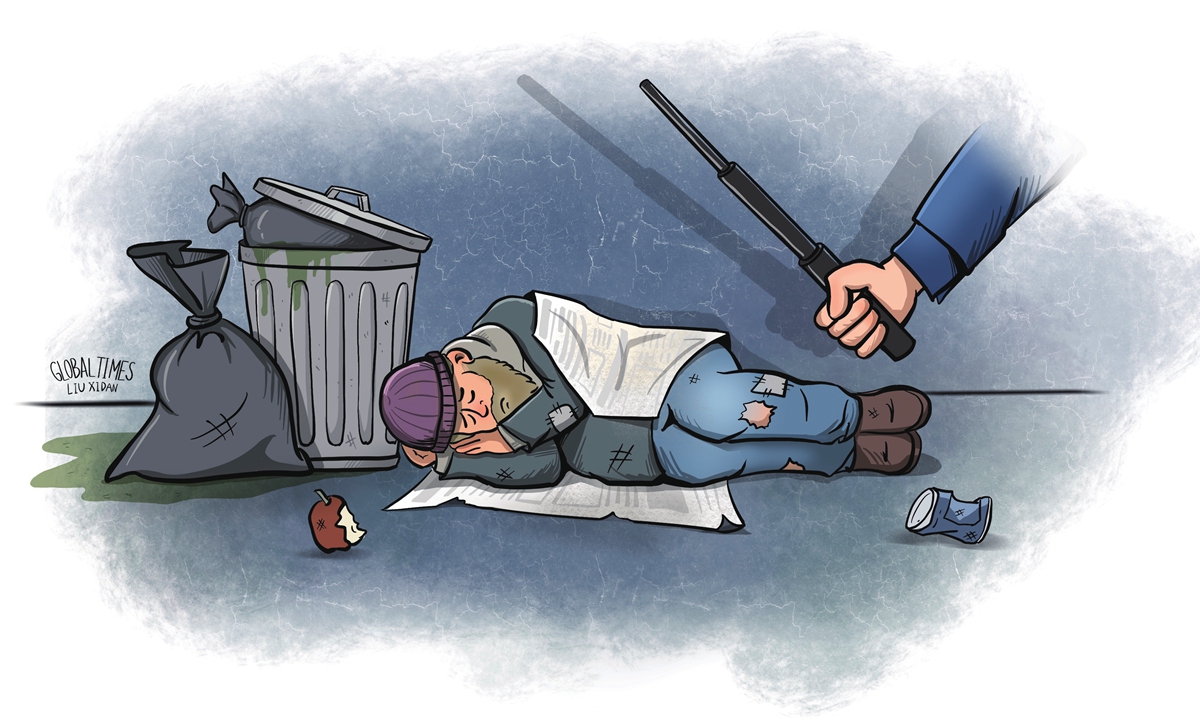
Illustration: Liu Xidan/GT
As the global community grapples with human rights issues, the treatment of unhoused individuals in the US raises significant concerns. An increasing number of homeless people are losing access to outdoor spaces as states and municipalities enact anti-vagrancy laws aimed at clearing out homeless populations. This punitive approach exacerbates the hardships faced by those already struggling, highlighting a severe lack of emphasis on human rights.
Brett Handorf, a 28-year-old liquor store worker from Orange Park, Florida, witnessed the immediate but fleeting impact of these laws. Handorf observed a brief disappearance of homeless individuals, but these people quickly returned. He also noted the absurdity of the cycle of homelessness in the US.
It is worth noting how serious the problem of homelessness is in the US. In a January 2023 report, the Department of Housing and Urban Development (HUD) found that there were 653,104 homeless Americans - about one in 500 people. That represents a 12.1 percent increase compared to the previous year and the highest point since at least 2007. Additionally, 37.3 percent of the homeless population identifies as black, African American, or African, while this demographic comprises 13.6 percent of the total population. Native Americans, Hispanics, and veterans also have disproportionate rates of homelessness.
The broader justice system in the US further compounds these challenges. Laura Riley, director of the clinical program at the University of California, Berkeley School of Law, highlights the systemic bias against the homeless.
In a New York Times op-ed, Riley pointed out that while defendants are guaranteed the right to counsel in criminal matters, this does not extend to eviction proceedings. "People on the brink of homelessness should have a right to counsel in eviction proceedings and should be offered the possibility of mediation in housing courts to give them a chance to remain in their houses or apartments," she argued.
The cycle of homelessness is difficult to escape due to multiple barriers. Employers generally require a permanent address for job applications, and obtaining a valid ID, which also requires an address, is essential for opening a bank account and obtaining a driver's license. Outlawing homelessness only makes escaping poverty more difficult, as finding employment becomes challenging with a criminal record. Draconian anti-vagrancy laws only exacerbate the root causes of homelessness, with many states lacking pathways to clear criminal records for low-level, non-violent offenses.
A significant remedy to homelessness is increasing affordable housing. However, the HUD is restricted from increasing public housing units beyond the levels set on October 1, 1999, due to the Faircloth Amendment to the Housing Act of 1937. This cap, coupled with a $70 billion backlog in repairs needed for existing public housing and a reduction in public housing spending, has severely limited housing options for the poor. Local zoning laws further complicate matters by banning public housing projects, often influenced by real estate development firms.
Repealing the Faircloth Amendment is a necessary step toward addressing the homelessness crisis in the US. Public housing was disparaged in the late 1990s, leading to bipartisan support for its decline. However, abandoning this outdated law is essential for moving forward. Anti-vagrancy laws, rather than solving homelessness, will only worsen the situation and deepen social inequalities.
To genuinely address homelessness, the US must prioritize human rights and implement systemic changes that provide housing and support for its most vulnerable populations.
The author is a Prague-based American journalist, columnist and political commentator. opinion@globaltimes.com.cn




